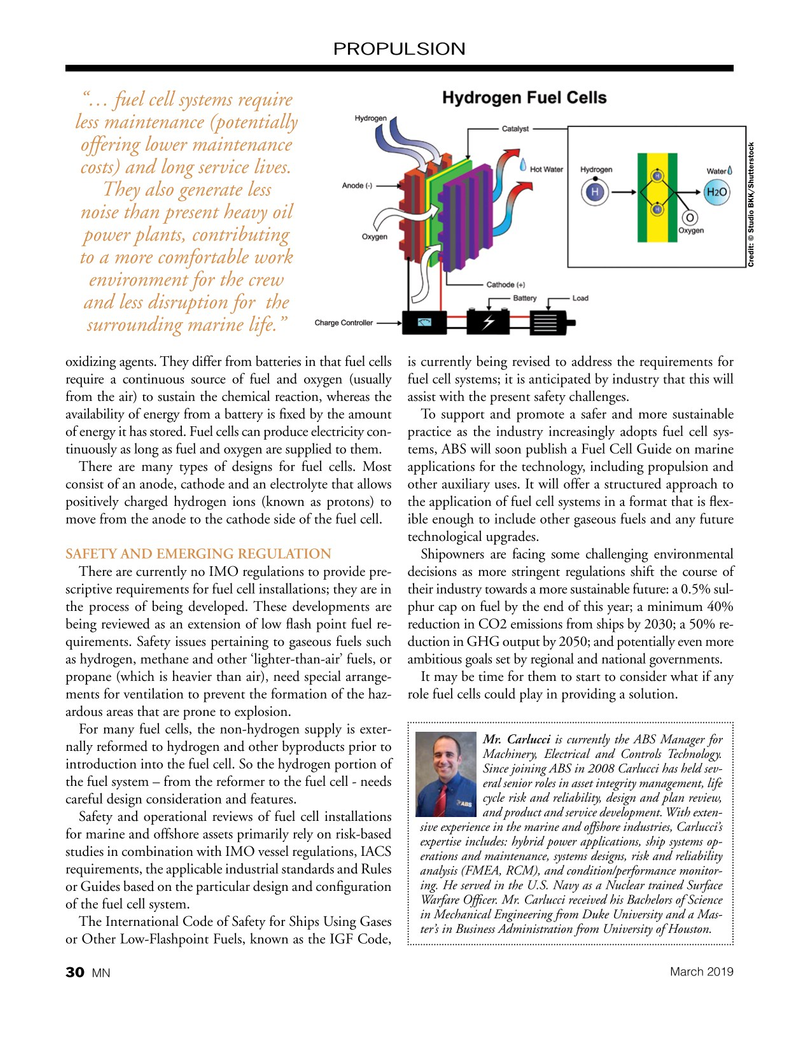
Page 30: of Marine News Magazine (March 2019)
Pushboats, Tugs & Assist Vessels
Read this page in Pdf, Flash or Html5 edition of March 2019 Marine News Magazine
PROPULSION “… fuel cell systems require less maintenance (potentially offering lower maintenance costs) and long service lives.
They also generate less noise than present heavy oil power plants, contributing to a more comfortable work
Credit: © Studio BKK/Shutterstock environment for the crew and less disruption for the surrounding marine life.” oxidizing agents. They differ from batteries in that fuel cells is currently being revised to address the requirements for require a continuous source of fuel and oxygen (usually fuel cell systems; it is anticipated by industry that this will from the air) to sustain the chemical reaction, whereas the assist with the present safety challenges.
availability of energy from a battery is fxed by the amount To support and promote a safer and more sustainable of energy it has stored. Fuel cells can produce electricity con- practice as the industry increasingly adopts fuel cell sys- tinuously as long as fuel and oxygen are supplied to them. tems, ABS will soon publish a Fuel Cell Guide on marine
There are many types of designs for fuel cells. Most applications for the technology, including propulsion and consist of an anode, cathode and an electrolyte that allows other auxiliary uses. It will offer a structured approach to positively charged hydrogen ions (known as protons) to the application of fuel cell systems in a format that is fex- move from the anode to the cathode side of the fuel cell. ible enough to include other gaseous fuels and any future technological upgrades.
sAFeTy AnD emerging regulATion Shipowners are facing some challenging environmental
There are currently no IMO regulations to provide pre- decisions as more stringent regulations shift the course of scriptive requirements for fuel cell installations; they are in their industry towards a more sustainable future: a 0.5% sul- the process of being developed. These developments are phur cap on fuel by the end of this year; a minimum 40% being reviewed as an extension of low fash point fuel re- reduction in CO2 emissions from ships by 2030; a 50% re- quirements. Safety issues pertaining to gaseous fuels such duction in GHG output by 2050; and potentially even more as hydrogen, methane and other ‘lighter-than-air’ fuels, or ambitious goals set by regional and national governments. propane (which is heavier than air), need special arrange- It may be time for them to start to consider what if any ments for ventilation to prevent the formation of the haz- role fuel cells could play in providing a solution. ardous areas that are prone to explosion.
For many fuel cells, the non-hydrogen supply is exter-
Mr. Carlucci is currently the ABS Manager for nally reformed to hydrogen and other byproducts prior to
Machinery, Electrical and Controls Technology. introduction into the fuel cell. So the hydrogen portion of
Since joining ABS in 2008 Carlucci has held sev- the fuel system – from the reformer to the fuel cell - needs eral senior roles in asset integrity management, life cycle risk and reliability, design and plan review, careful design consideration and features.
and product and service development. With exten-
Safety and operational reviews of fuel cell installations sive experience in the marine and offshore industries, Carlucci’s for marine and offshore assets primarily rely on risk-based expertise includes: hybrid power applications, ship systems op- studies in combination with IMO vessel regulations, IACS erations and maintenance, systems designs, risk and reliability requirements, the applicable industrial standards and Rules analysis (FMEA, RCM), and condition/performance monitor- ing. He served in the U.S. Navy as a Nuclear trained Surface or Guides based on the particular design and confguration
Warfare Offcer. Mr. Carlucci received his Bachelors of Science of the fuel cell system.
in Mechanical Engineering from Duke University and a Mas-
The International Code of Safety for Ships Using Gases ter’s in Business Administration from University of Houston.
or Other Low-Flashpoint Fuels, known as the IGF Code,
March 2019 MN 30

 29
29

 31
31
